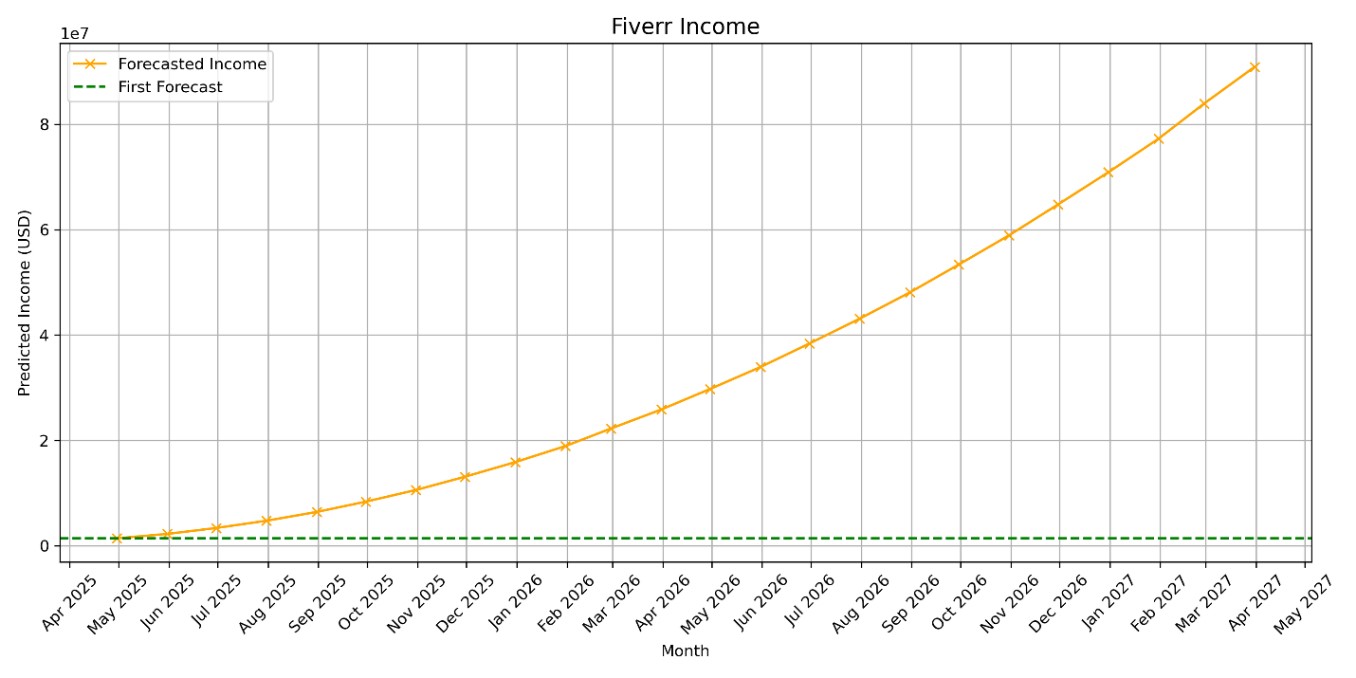Predicting the AI-Driven Freelance Marketplace. A Case Study of Fiverr Gigs of Pakistan
Keywords:
Artificial Intelligence, Freelancing, Gig-economy, Pakistan, FiverrAbstract
Artificial Intelligence (AI) affects worldwide economic performance because freelance marketplaces have become fundamental platforms to use AI innovations. This research examines AI effects on Pakistan's freelance market using Fiverr gigs while focusing on AI mobile application development, together with AI website/software development services. The selection of these categories occurred because clients increasingly needed them, while contemporary industries required more AI-powered solutions. The research gathers Fiverr gig information systematically to identify main patterns about service types and client patterns, and freelancer earnings in the AI domains. Second-degree polynomial regression analyzed with Ridge regularization methods generated predictions about income development during 24 months from April 2025 until March 2027. Data shows a robust non-linear pattern of growth, which demonstrates that AI-powered freelance services provide substantial income benefits to Pakistani skilled freelancers, thus making Pakistan a rising center for AI-based digital freelancers development. Along with analyses of system competition, skills difficulty, and market capacity saturation, the research suggests proven methods to address these factors. This research provides strategic guidance to freelancers, together with investors and policymakers, who intend to enhance Pakistan's position in the global freelance AI economy. Continuous skill development alongside enhanced infrastructure and supportive policy frameworks will enable the complete economic extraction of AI-driven freelance marketplaces, according to the research findings.
References
F. R. y B. Hu1, Z. J.Chen, L.Huang, Y.Burdet, E., “Priority-Based Shared Control for Peg Transfer Task,” 15TH HAMLYN Symp. Med. Robot., 2023, [Online]. Available. https.//www.hamlynsymposium.org/wp-content/uploads/2023/07/HSMR23-Proceedings-Final.pdf#page=131
S. S. Pyeonghwa Kim, EunJeong Cheon, “Online Freelancing on Digital Labor Platforms. A Scoping Review,” CSCW ’23 Companion Companion Publ. 2023 Conf. Comput. Support. Coop. Work Soc. Comput., pp. 259–266, 2023, doi. https.//doi.org/10.1145/3584931.3607011.
S. Irfan, “Overview of freelancing Industry of Pakistan,” Pakistan Today, 2024, [Online]. Available. https.//www.pakistantoday.com.pk/2024/08/21/overview-of-freelancing-industry-of-pakistan/
X. Z. Ozge Demirci, Jonas Hannane, “Who is AI Replacing? The Impact of Generative AI on Online Freelancing Platforms,” CESifo, p. 33, 2024, [Online]. Available. https.//papers.ssrn.com/sol3/papers.cfm?abstract_id=4991774
Y. L. Yong TanXi Nan, Jin Liu, Xingchen Xu, “‘Generate’ the Future of Work through AI. Empirical Evidence from Online Labor Markets,” SSRN, p. 65, 2023, [Online]. Available. https.//papers.ssrn.com/sol3/papers.cfm?abstract_id=4529739
L. Z. Xiang Hui , Oren Reshef, “The Short-Term Effects of Generative Artificial Intelligence on Employment. Evidence from an Online Labor Market,” Organ. Sci., vol. 35, no. 6, 2024, [Online]. Available. https.//pubsonline.informs.org/doi/10.1287/orsc.2023.18441
Ken Huang & Feng Zhu, “ChatGPT and Gig Economy,” Beyond AI, pp. 129–158, 2023, doi. https.//doi.org/10.1007/978-3-031-45282-6_5.
P. T. Mai Nguyen, Ying Chen, Thanh Huong Nguyen, Sara Shawky Habashi, Sara Quach, “Artificial intelligence (AI)-driven services Communication support, assistance for decision-making, and enhanced customer experience service,” Artif. Intell. Mark. Manag., p. 20, 2022, [Online]. Available. https.//www.taylorfrancis.com/chapters/edit/10.4324/9781003280392-8/artificial-intelligence-ai-driven-services-mai-nguyen-ying-chen-thanh-huong-nguyen-sara-shawky-habashi-sara-quach-park-thaichon
O. K. A. P. Richard Boateng, Sheena Lovia Boateng, Thomas Anning-Dorson, Emmanuel Awuni Kolog, Joseph Budu, John Serbe Marfo, “Leveraging AI for Freelancing Current and Future Prospects,” CRC Press, p. 258, 2025, doi. https.//doi.org/10.4324/9781003507314.
N. Ahsan, M. N., Rafiq, M., Hassan, M., & Gohar, “Impact of online freelancing on economic growth of developing countries like Pakistan,” Asian J. Manag. Entrep. Soc. Sci., vol. 2, no. 2, pp. 209–228, 2022.
S. Irfan, “The Flip Side of Freelancing Industry of Pakistan,” Mod. Dipl., 2024, [Online]. Available. https.//moderndiplomacy.eu/2024/05/07/the-flip-side-of-freelancing-industry-of-pakistan/
O. Kässi and V. Lehdonvirta, “Online labour index. Measuring the online gig economy for policy and research,” Technol. Forecast. Soc. Change, vol. 137, pp. 241–248, 2018, [Online]. Available. https.//www.sciencedirect.com/science/article/abs/pii/S0040162518301331?via%3Dihub
and M. S. J. Berg, M. Furrer, E. Harmon, U. Rani, “Digital labour platforms and the future of work. Towards decent work in the online world,” Int. Labour Off. Geneva, 2018.
B. Silverman, “Fiverr Gig Analytics. A Data-Driven Guide to Freelancing Success,” New York Freel. Press, 2021.
Malik and F. Wahid, “The growth of freelancing in Pakistan. A sociotechnical perspective,” Proc. 2022 Int. Conf. Inf. Syst. Technol. (ICIST), Islam. Pakistan, pp. 93–98, 2022.
M. Graham and M. A. Anwar, “The global gig economy. Towards a planetary labour market?,” First Monday, vol. 24, no. 4, 2019, doi. https.//doi.org/10.5210/fm.v24i4.9913.
C. Mims, “AI Doesn’t Kill Jobs? Tell That to Freelancers,” Wall Str. J., 2024, [Online]. Available. https.//www.wsj.com/tech/ai/ai-replace-freelance-jobs-51807bc7
P. Jain, R., Gupta, S., & Agarwal, “The Role of Freelancing Platforms in the Digital Economy. Trends and Future Predictions,” Digit. Work J., vol. 15, no. 2, pp. 34–58, 2023.
R. Mitchell, “Web Scraping with Python. Collecting More Data from the Modern Web (2nd ed.),” O’Reilly Media, 2018.
H. H. Rahm, E., & Do, “Data Cleaning and Integration. A Framework for Efficient Processing of Large-Scale Datasets,” J. Inf. Sci., vol. 18, no. 2, pp. 89–110, 2021.
R. M. Silva et al., “Vulnerable Road User Detection and Safety Enhancement. A Comprehensive Survey,” May 2024, Accessed. Oct. 24, 2024. [Online]. Available. https.//arxiv.org/abs/2405.19202v3
T. S. Munir Ahmad, Taib Ali, Nabeel Ali Khan, Asima Afzal, Talha Bin Sohail, “Predicting Long-term Visual Outcomes for Robot Manipulation Using Vision-based Techniques,” VAWKUM Trans. Comput. Sci., vol. 12, no. 2, 2024, doi. https.//doi.org/10.21015/vtcs.v12i2.1961.
S. K. and S. G. J. Kalajdjieski, K. Trivodaliev, G. Mirceva, “A Complete Air Pollution Monitoring and Prediction Framework,” IEEE Access, vol. 11, pp. 88730–88744, 2023, [Online]. Available. https.//ieeexplore.ieee.org/document/10057411

Downloads
Published
How to Cite
Issue
Section
License
Copyright (c) 2025 50sea

This work is licensed under a Creative Commons Attribution 4.0 International License.




















